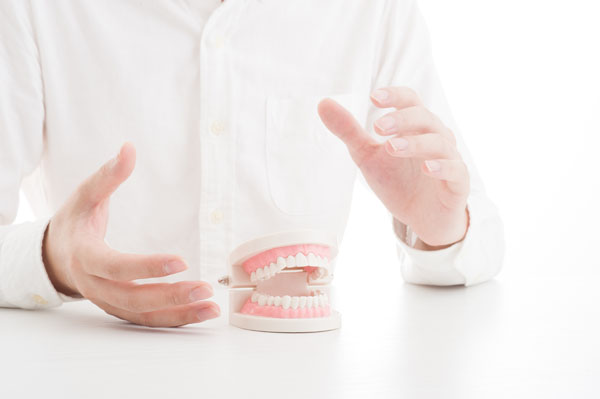 Dentures are a fantastic option for dealing with missing teeth, but even with proper care, you are likely going to need to look into denture repairs at some point. Millions of people choose dentures as their treatment option. They are one of the best, most reliable options for addressing missing teeth. Helping to restore your smile and function, including chewing and speech, they are a relatively easy fix for one of the country’s biggest dental care problems.
Dentures are a fantastic option for dealing with missing teeth, but even with proper care, you are likely going to need to look into denture repairs at some point. Millions of people choose dentures as their treatment option. They are one of the best, most reliable options for addressing missing teeth. Helping to restore your smile and function, including chewing and speech, they are a relatively easy fix for one of the country’s biggest dental care problems.
Just like with your teeth, dentures require proper hygiene—daily. Failing to care for your dentures properly will cause them to deteriorate like your teeth normally would. Over time, they can become misshapen or broken, requiring repairs or replacements. Similarly, accidents happen, and you or another person may inadvertently damage the dentures. Finally, even for those exercising the best of care, your dentures will ultimately need some repairs for everyday wear and tear over time.
Dentures are unique to every patient
Before understanding the types of repairs that might be needed, it is important to understand some general knowledge about dentures and how they’re made. Typically, dentures are comprised of a gum-colored base and teeth. They are easily removable. There are partial dentures that replace only a few teeth and only fit into a part of the mouth, and full dentures replace a full row of teeth throughout the mouth.
Every patient is different. Every mouth is different, and every set of teeth. Similarly, every set of dentures are different. Your dentist will evaluate you and, through a multi-step, complete process, will model and create a brand-new set of dentures that match your gum shape, teeth, and color.
This is a highly technical process designed to make dentures that fit perfectly into your mouth. The need for this precision is because even if the dentures are slightly misshapen or don’t fit, you will likely have more trouble chewing or even speaking.
Normal wear and tear and denture repairs
Dentures typically have a shelf life of around five to seven years. This means that after that amount of time, they’ll need replacing. However, to ensure that you get the full potential out of your dentures, you will need to exercise good care and know when your dentures may need repairing. Exercising good care includes brushing your denture teeth daily (just like your regular teeth) and properly storing the dentures.
Ultimately, you will likely notice some changes in how your dentures fit. For one, you will change as you age, including small changes in your gums, teeth, cheeks, and general structure of the mouth. This will change how your dentures fit. Further, dentures themselves can warp over time, and as they become misshapen, damage may be exacerbated. Repeated chewing with misfit dentures will cause more damage.
Talk to your dentist about repairs
As such, if you notice any issues, it’s important to speak with your dentist to see if you need repairs, including realignment, reinforcing, or partial remaking. Getting the repairs as soon as possible helps you maximize your dentures’ life. Not only that, but it will also help you save more money, as it means they need less frequent denture repairs. Speak with your dentist for more information on proper care and the need for repairs.
Request an appointment or call Dentistry for Woodstock at 770-238-1437 for an appointment in our Woodstock office.
Recent Posts
Monitoring and denture adjustments allow your dentures to remain useful and comfortable throughout their lifespan. These proactive measures enable your prosthetic teeth to mimic the function of natural teeth without the discomfort of slippage and injury. Here is how denture adjustments can solve common problems that come up when you live with dentures.Dental prosthetics like…
You might not expect to need denture adjustments after being fitted for a brand-new set of dentures. However, even a new appliance might need adjusting early on.During the first month, it is essential to pay careful attention to the comfort and feel of your new dental prosthetic. It is normal to experience an adjustment period…
You will need one or more denture adjustments as your jawbone and gums change. This is why dentists and prosthodontists recommend regular checkups — to track the gradual changes in your mouth. The type of adjustment that your dentures need will depend on their structural soundness. It will also depend on the difference between the…


